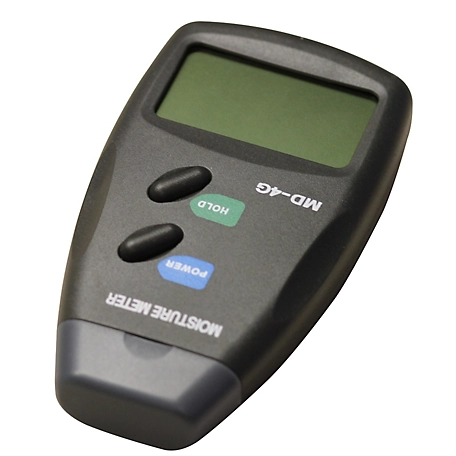The Ultimate Overview to Moisture Meters: A Comprehensive Review and Just How They Can Conserve You Money
Dampness meters serve as essential tools in identifying and monitoring moisture web content in products, helping in stopping expensive damages and making certain the quality of products. Recognizing the nuances of various types of dampness meters, their applications, and the potential cost-saving advantages they supply can be a game-changer for services and experts alike.
Sorts Of Moisture Meters
Various kinds of moisture meters are available for various applications in numerous industries. One common kind is the pin-type dampness meter, which determines the electrical resistance between 2 pins inserted right into a product. This type appropriates for wood, drywall, and other structure products. Pinless dampness meters, on the various other hand, use electromagnetic sensing unit plates to scan a bigger area without causing damages to the product's surface. Moisture Meter. These meters are suitable for swiftly assessing dampness degrees in big locations such as floors and walls.

Infrared wetness meters gauge the thermal residential properties of a material to determine its wetness web content non-invasively, making them helpful for applications where pin or pinless meters might not be appropriate. Recognizing the various kinds of dampness meters offered can assist markets choose the most suitable tool for their particular moisture measurement requirements.

Benefits of Using Moisture Meters
Dampness meters offer important benefits in properly analyzing and keeping track of dampness levels in varied materials and environments. One of the primary benefits of making use of moisture meters is the avoidance of potential damage created by excess wetness.
Moreover, using dampness meters can lead to raised energy performance. By determining areas with high dampness levels, such as leaks or bad insulation, modifications can be made to enhance power conservation and reduce utility prices. In agricultural settings, dampness meters play an important function in maximizing crop yields by making it possible for farmers to check dirt moisture degrees and make educated watering choices. Generally, the advantages of utilizing wetness meters cover throughout numerous sectors, providing economical solutions and advertising better quality assurance techniques.
Just How to Choose the Right Dampness Meter
When picking a wetness meter, it's important to make sure that the meter is appropriate for the specific material you will be testing. Different products have varying electric properties that can affect moisture analyses, so picking a meter designed for your material is important for precise outcomes. By carefully evaluating these elements, you can pick a moisture meter that satisfies your demands and provides accurate dampness measurements for your projects.
Proper Techniques for Dampness Meter Usage

Price Financial Savings With Wetness Meter Applications
Exactly how can the strategic use of dampness meters lead to significant price financial savings across various markets? In the agriculture market, wetness meters aid in figuring out the ideal time for gathering plants, stopping excess or over-drying wetness that can influence the last product's quality.
Likewise, in construction, moisture meters help protect against costly damages by finding wetness levels in structure materials, such as timber or concrete, which can bring about structural problems otherwise dealt with additional hints quickly. By identifying trouble locations at an early stage, service providers can take restorative steps to stay clear of considerable fixings or replacements, ultimately saving money and time.
Moreover, in the food handling market, dampness meters are vital for keeping track of item top quality and ensuring compliance with security guidelines. By precisely gauging wetness content in foodstuff, manufacturers can stop perishing, maintain freshness, and minimize waste, causing substantial expense savings. Overall, the strategic application of wetness meters is an important investment that can cause substantial price decreases and boosted efficiency across various industries.
Final Thought
In final thought, moisture meters are important devices for finding and gauging wetness levels in different products. By utilizing the ideal discover here wetness meter and complying with proper techniques, users can effectively stop costly damages triggered by excess dampness.
Moisture meters serve as essential devices in identifying and keeping track of moisture content in materials, assisting in preventing costly problems and ensuring the top quality of items. Infrared moisture meters gauge the thermal residential properties of a product to determine its dampness web content non-invasively, making them valuable for applications where pin or pinless meters may not be suitable.Wetness meters supply vital advantages in accurately keeping track of and evaluating dampness levels in varied products and settings. In farming settings, moisture meters play a critical function in enhancing plant returns by allowing farmers to check soil dampness levels and make notified irrigation decisions.In final thought, moisture meters are beneficial devices for identifying and determining wetness levels in different products.
Comments on “The Ultimate Overview to Selecting the Right Moisture Meter for Your Demands”